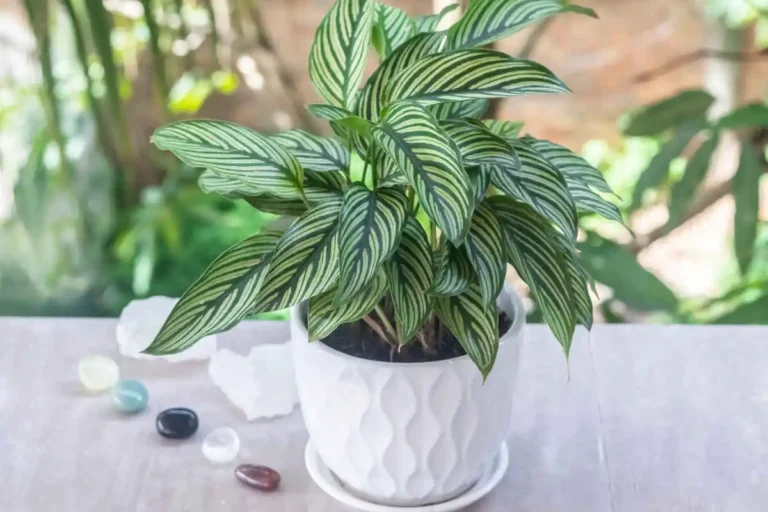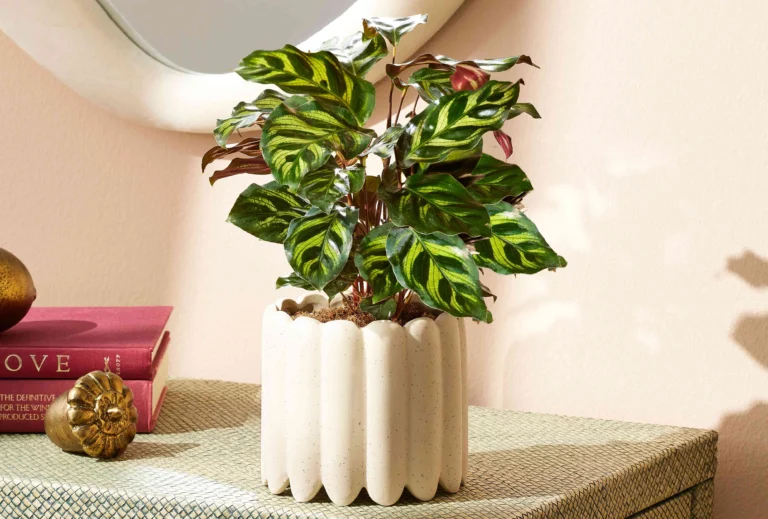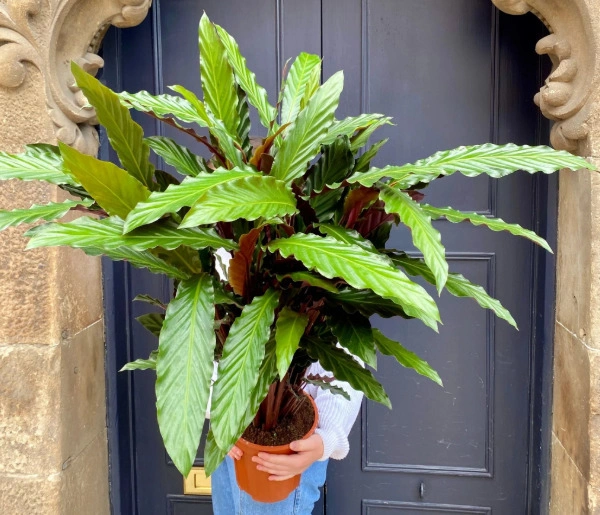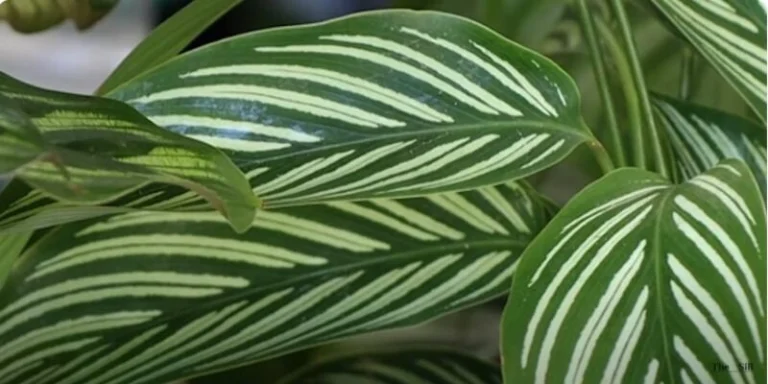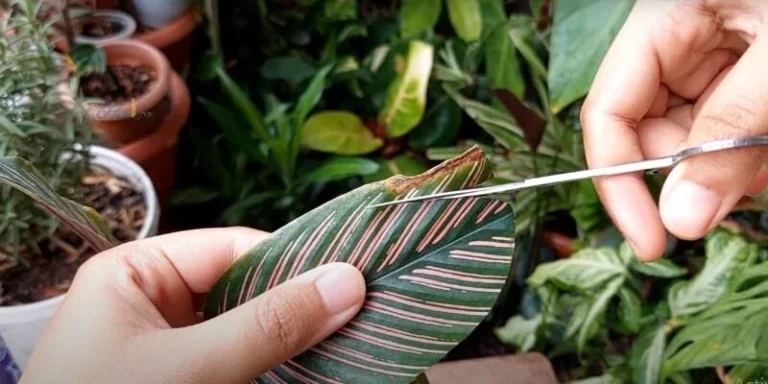Types of Calathea Plants: 25 Varieties to Grow Indoors [with images]
Are you looking to add some tropical vibe to your indoor garden but need clarification on where to start? Don’t worry—fall in love with Calathea, a gorgeous tropical plant with immensely decorative leaves that enchant you at first sight.
However, with so many Calathea types available, it becomes difficult to choose your favorite variety. Calathea plants have over 60 distinct species, characterized by their ornately patterned, brightly colored foliage.
This article will look at different types of Calathea you can grow in your indoor garden space. We will also share some care tips, as calatheas can be a little tricky to care for when grown indoors due to their tropical origin.
![Types of Calathea Plants: 25 Varieties to Grow Indoors [with images] 1 Calathea Types](https://tropicalplantscare.com/wp-content/uploads/2025/04/TBG-Blog-Calatheas3_2000x-1024x655.webp)
An Overview About Calathea Plants Varieties
Calathea is a genus of flowering plants with over 60 distinct species and many varieties within each species within the Marantaceae family. It is important to note that some Calathea varieties have also been classified in the Goeppertia genus, which also falls under the Marantaceae family.
These tropical plants, also called prayer plants, are native to the Tropical Americas, Brazil, and Colombia, where they are grown in the understory in indirect, bright, filtered light. These tropical plants exhibit the phenomenon of nyctinasty, which involves the closure of their leaves at night, akin to the motion of praying hands.
Calatheas can be grown outside in USDA plant hardiness zones 11 and 12. They can also be grown indoors as houseplants but can be tricky to care for. However, some simple tricks can help these plants grow ideally and avoid dreaded crispy leaves by getting indirect, bright light and water per their needs. These plants produce white or pink blooms in the wild but rarely bloom when grown indoors. Calathea can grow to a height of 1 to 3 feet, contingent upon the type or variant of the plant.
Also check What is Calathea Plant?
25 Calathea Varieties and Types
Numerous Calathea varieties are available, making selecting a particular one for domestic cultivation challenging.
The following are several stunning varieties of Calathea plants, along with some helpful care tips. Some species are widespread and easily accessible, while others are scarce; however, the search is an enjoyable experience.
1. Calathea Rufibarba (Valvet Calathea)
Calathea rufibarba, also known as Velvet Calathea, is a unique Calathea plant with velvety leaves and a unique texture. It has long, slender, light-to-dark green leaves with ruffled feather shapes, which is why it is also known as the “Fluffy Feather Plant.”
The plant is native to Brazil’s northern region and is reclassified as Goeppertia rufibarba under the Marantaceae family. Its foliage reaches a height of 3 feet and creates a mass of greenery to decorate a nook or corner of your home.
![Types of Calathea Plants: 25 Varieties to Grow Indoors [with images] 2](https://tropicalplantscare.com/wp-content/uploads/2025/04/Calathea-2-1024x768.webp)
Classification
![Types of Calathea Plants: 25 Varieties to Grow Indoors [with images] 3 types of Calathea](https://tropicalplantscare.com/wp-content/uploads/2025/04/Types-of-calathea.webp)
2. Calathea Crotalifera (Rattlesnake Plant)
Calathea varieties. One of them is Calathea crotalifera.
The plant’s name is due to its distinct follower, which is yellow and is identical to the intimidating tail of a rattlesnake. Its flower can grow up to 10 inches long and sticks straight up.
Crotalifera is native to Mexico and regions of Central and South America. It was later introduced to and thrived well in Hawaii.
![Types of Calathea Plants: 25 Varieties to Grow Indoors [with images] 4 Types of calathea](https://tropicalplantscare.com/wp-content/uploads/2025/04/2-2.webp)
Classification
![Types of Calathea Plants: 25 Varieties to Grow Indoors [with images] 5 Calathea Crotalifera (Rattlesnake Plant)](https://tropicalplantscare.com/wp-content/uploads/2025/04/1-rattlesnake-calathea-crotalifera-tropical-flowering-ginger-original-imafgszup8e8eeys-1.webp)
3. Calathea Lancifolia
Calathea lancifolia is also known as the rattlesnake plant. The variety gained this name due to its long, narrow-patterned leaves with light and dark green markings. The undersides of its leaves show a deep purple color.
Native to the southeast regions of Brazil, the plant is reclassified as Goeppertia insignis and is ideal in large pots or as a floor plant.
![Types of Calathea Plants: 25 Varieties to Grow Indoors [with images] 6 Types of calathea](https://tropicalplantscare.com/wp-content/uploads/2025/04/3-1.webp)
Classification
![Types of Calathea Plants: 25 Varieties to Grow Indoors [with images] 7 Calathea Lancifolia](https://tropicalplantscare.com/wp-content/uploads/2025/04/growing-rattlesnake-plants-5088292-3-c37f03dd6a0e491a91e837d28d06b1f2.webp)
4. Calathea Zebrina (Zebra Plant)
Calathea zebrina, also known as the zebra plant, is one of the most common Calathea varieties you can grow indoors.
The variety is loved for its long, oval leaves with alternating tripped patterns of light green and dark green, similar to a zebra’s stripes. Its bright green stems reward you with dramatic foliage.
Calathea zebrina is native to Brazil and Mexico’s tropical regions and has now been reclassified as Goeppertia zebrina.
![Types of Calathea Plants: 25 Varieties to Grow Indoors [with images] 8 Calathea Zebrina (Zebra Plant)](https://tropicalplantscare.com/wp-content/uploads/2025/04/4-2.webp)
Classification
![Types of Calathea Plants: 25 Varieties to Grow Indoors [with images] 9 Calathea](https://tropicalplantscare.com/wp-content/uploads/2025/04/shutterstock_1987827116.webp)
5. Calathea Roseoptica (Calathea Rosy, Dottie, or Corona)
Calathea reseoptica, also known as Corona or Rose Painted Calathea, is a rare plant that has become popular among plant owners.
The plant has a silvery-green center surrounded by a thin border of dark green leaves. Its stems and undersides are a deep pinky crimson, the distinguishing feature of the Calathea plants.
Calathea corona is similar to another roseoptica variety known as Cynthia, which mirrors the Corona inversely with a dark green center surrounded by a thin border of silver-green color. The plant has also been reclassified as Goeppertia roseoptica.
![Types of Calathea Plants: 25 Varieties to Grow Indoors [with images] 10 Calathea Roseoptica (Calathea Rosy, Dottie, or Corona)](https://tropicalplantscare.com/wp-content/uploads/2025/04/5-1.webp)
Classification
![Types of Calathea Plants: 25 Varieties to Grow Indoors [with images] 11 Calathea Roseoptica (Calathea Rosy, Dottie, or Corona)](https://tropicalplantscare.com/wp-content/uploads/2025/04/calathea-roseopicta-1024x576.jpg)
6. Calathea Ornata (Beauty Star Calathea or Pinstripe Plant)
Calathea ornata, also known as “Beauty Star” or “Pinstripe Plant,” is one of the most admired varieties because of its leaf patterns. Its leaves are covered with bold white or pinkish-white stripes that protrude outward from the center vein, making a striking display against the dark green background.
The plant has been reclassified as Goeppertia ornata.
![Types of Calathea Plants: 25 Varieties to Grow Indoors [with images] 12 Calathea Ornata (Beauty Star Calathea or Pinstripe Plant)](https://tropicalplantscare.com/wp-content/uploads/2025/04/6-1.webp)
Classification
![Types of Calathea Plants: 25 Varieties to Grow Indoors [with images] 13 Calathea Ornata (Beauty Star Calathea or Pinstripe Plant)](https://tropicalplantscare.com/wp-content/uploads/2025/04/Calathea-Orneta-Sanderiana-1024x576.jpg)
7. Calathea Warscewiczii (Calathea Jungle Velvet, Prayer Plant)
Calathea Warscewiczii, also known as “Jungle Velvet,” gets its name from its soft and velvety leaves with distinct light green veins. The undersides of the leaves are a striking maroon or purple.
These are the actual prayer-plants that show nyctinasty movements in response to temperature and light. During their growing season, the plants produce delicate cream flower cones.
![Types of Calathea Plants: 25 Varieties to Grow Indoors [with images] 14 Calathea Warscewiczii (Calathea Jungle Velvet, Prayer Plant)](https://tropicalplantscare.com/wp-content/uploads/2025/04/7-1.webp)
Classification
![Types of Calathea Plants: 25 Varieties to Grow Indoors [with images] 15 Calathea Warscewiczii (Calathea Jungle Velvet, Prayer Plant)](https://tropicalplantscare.com/wp-content/uploads/2025/04/healthy-leaves-of-warscewiczii.webp)
8. Calathea Makoyana (Peacock Plant)
Calathea makoyana is also known as the Cathedral makoyana or Peacock plant and is a popular houseplant. Its slim, purple, or dark green leaves feature delicate white, creamy, or bright green feathering that looks similar to the coloring of a Peacock feather. The edges of the leaves have a slight wave and a slim, medium-green border.
![Types of Calathea Plants: 25 Varieties to Grow Indoors [with images] 16 Calathea Makoyana (Peacock Plant)](https://tropicalplantscare.com/wp-content/uploads/2025/04/8-2.webp)
Classification
![Types of Calathea Plants: 25 Varieties to Grow Indoors [with images] 17 Calathea Makoyana (Peacock Plant)](https://tropicalplantscare.com/wp-content/uploads/2025/04/peacock-plant-care-calathea-makoyana-7.jpg)
9. Calathea Orbifolia (Round Leaf Plant)
The Calathea orbifold, also known as the Round Leaf Plant or Orbifolia Prayer Plant, is a popular Calathea variety that will brighten every corner. As the name suggests, the plant has round or oval-shaped leaves measuring 8 to 15 inches long and 10 to 15 inches wide. The leaves have a slightly lighter green variegation along the rib and outer edges of the leaf with striking silver-green undersides.
The orbifolia prayer plant is easy to care for and has now been reclassified as Goeppertia orbifolia.
![Types of Calathea Plants: 25 Varieties to Grow Indoors [with images] 18 Calathea Orbifolia (Round Leaf Plant)](https://tropicalplantscare.com/wp-content/uploads/2025/04/9.webp)
Classification
![Types of Calathea Plants: 25 Varieties to Grow Indoors [with images] 19 Calathea Orbifolia (Round Leaf Plant)](https://tropicalplantscare.com/wp-content/uploads/2025/04/shutterstock_2247880751.jpg)
10. Calathea Crocata (Eternal Flame Plant)
Calathea crocata is also called the “Eternal Flame Plant” due to its unique, bright orange flowers. The flowers bloom on erect stems above the rosette of shiny, slightly wrinkled dark green leaves with maroon-purple undersides. This magic floral appearance is most intense in the summer and lasts two to three months. The plant has now been reclassified as Goeppertia crocata.
![Types of Calathea Plants: 25 Varieties to Grow Indoors [with images] 20 Calathea Crocata (Eternal Flame Plant)](https://tropicalplantscare.com/wp-content/uploads/2025/04/10.webp)
Classification
![Types of Calathea Plants: 25 Varieties to Grow Indoors [with images] 21 Calathea Crocata (Eternal Flame Plant)](https://tropicalplantscare.com/wp-content/uploads/2025/04/eternal-flame-plant-1-1024x683.webp)
11. Calathea Veitchiana (Calathea Medallion)
The Medallion Prayer plant, also known as Calathea medallion (Calathea Veitchiana), is a favored houseplant due to its unique markings.
Its beautiful variegated leaves have deep or dark green bases adorned with a feather of olive green surrounded by darker green and a creamy outline.
This variety has now been reclassified as Goeppertia veitchiana.
![Types of Calathea Plants: 25 Varieties to Grow Indoors [with images] 22 Calathea Veitchiana (Calathea Medallion)](https://tropicalplantscare.com/wp-content/uploads/2025/04/11.webp)
Classification
![Types of Calathea Plants: 25 Varieties to Grow Indoors [with images] 23 Calathea Veitchiana (Calathea Medallion)](https://tropicalplantscare.com/wp-content/uploads/2025/04/calathea-medallion-featured-scaled-1-1024x512.jpg)
12. Calathea Leopardina (Freddie)
Calathea leopardina (Freddie) is one of the most popular houseplant types, and it has green leaves from both the face and the back. The upper side of the leaf is light green with dark green spots or spotted stripes that look like leopard patterns. Its long stems hold its horizontal leaves.
The plant has now been reclassified as Goeppertia concinna.
![Types of Calathea Plants: 25 Varieties to Grow Indoors [with images] 24 Calathea Leopardina (Freddie)](https://tropicalplantscare.com/wp-content/uploads/2025/04/12.webp)
Classification
![Types of Calathea Plants: 25 Varieties to Grow Indoors [with images] 25 Calathea Leopardina (Freddie)](https://tropicalplantscare.com/wp-content/uploads/2025/04/Calathea-Cropped.webp)
13. Calathea Vittata (Elliptica)
Calathea vittata (Elliptica) is a famous houseplant that will bloom small cream-colored flowers with distinct lavender or fuschia edges on its petals when grown in the wild.
When grown indoors, it will rarely bloom but produce gorgeous leaves with small bursts of bright green over its dark green face. Its classification in the Goeppertia genus has given it the name Goeppertia Elliptica.
![Types of Calathea Plants: 25 Varieties to Grow Indoors [with images] 26 Calathea Vittata (Elliptica)](https://tropicalplantscare.com/wp-content/uploads/2025/04/13.webp)
Classification
![Types of Calathea Plants: 25 Varieties to Grow Indoors [with images] 27 v249evg837d81 scaled](https://tropicalplantscare.com/wp-content/uploads/2025/04/v249evg837d81-scaled.webp)
14. Calathea Fucata
Calathea fucata is a large-leaf Calathea variety, visually similar to the Freddie (Calathea leopardina). However, the variegation on the fucata is more subtle than that on the Calathea leopardina because the colors are lighter.
The variety grows taller than other houseplant Calathea varieties. Recently, it has been named Goeppertia fucata.
![Types of Calathea Plants: 25 Varieties to Grow Indoors [with images] 28 Calathea Fucata](https://tropicalplantscare.com/wp-content/uploads/2025/04/14-1.webp)
Classification
![Types of Calathea Plants: 25 Varieties to Grow Indoors [with images] 29 Calathea Varieties 1600x900 1](https://tropicalplantscare.com/wp-content/uploads/2025/04/Calathea-Varieties-1600x900-1.webp)
15. Calathea Undulata
Calathea undulata is a Calathe variety that grows under the canopy of large tropical trees. The plant has light, silvery-green tips that run along the leaf’s rib and are covered by a solid dark green color.
This is one of the most miniature Calathea varieties and has now been named Goeppertia undulata.
![Types of Calathea Plants: 25 Varieties to Grow Indoors [with images] 30 Calathea Undulata](https://tropicalplantscare.com/wp-content/uploads/2025/04/15.webp)
Classification
![Types of Calathea Plants: 25 Varieties to Grow Indoors [with images] 31 Calathea Undulata](https://tropicalplantscare.com/wp-content/uploads/2025/04/medium_menu_8fdc1e77-5cad-499e-8753-0a8dca837747.webp)
16. Calathea Albertii
Calathea Albertii is another commonly available Calathea variety that can be fussy but, with the proper care, can be a great addition to your home garden. It has green leaves with dark coloring and purple undersides.
![Types of Calathea Plants: 25 Varieties to Grow Indoors [with images] 32 Calathea Albertii](https://tropicalplantscare.com/wp-content/uploads/2025/04/16.webp)
Classification
![Types of Calathea Plants: 25 Varieties to Grow Indoors [with images] 33 Calathea Albertii](https://tropicalplantscare.com/wp-content/uploads/2025/04/rufibarba_Calathea_Prayer_Plant_Rooted_Cuttings_Wholesale-12.webp)
17. Calathea Stromanthifolia
Calathea stromanthifolia has vibrant oblong leaves surrounded by thin purple stems. The leaves feature an outward dark green pattern starting from the leaf’s rib, which is covered by a silvery-green background.
![Types of Calathea Plants: 25 Varieties to Grow Indoors [with images] 34 Calathea Stromanthifolia](https://tropicalplantscare.com/wp-content/uploads/2025/04/17.webp)
Classification
![Types of Calathea Plants: 25 Varieties to Grow Indoors [with images] 35 Calathea stromanthifolia Botanischer Garten Heidelberg Germany DSC01032](https://tropicalplantscare.com/wp-content/uploads/2025/04/Calathea_stromanthifolia_-_Botanischer_Garten_-_Heidelberg_Germany_-_DSC01032.webp)
18. Calathea Anulque
Calathea anulque is a leafy variant that is endemic to Ecuador. It means that the plant does not grow anywhere else natively.
The plant has a bud-like flower that turns a bright orange color at full bloom. However, these plants rarely bloom when kept in environments that don’t correspond to their native conditions.
![Types of Calathea Plants: 25 Varieties to Grow Indoors [with images] 36 Calathea Anulque](https://tropicalplantscare.com/wp-content/uploads/2025/04/18.webp)
Classification
![Types of Calathea Plants: 25 Varieties to Grow Indoors [with images] 37 Calathea Anulque](https://tropicalplantscare.com/wp-content/uploads/2025/04/Anulque.jpg)
19. Calathea Fasciata
Calathea fasciata is a classic Calathea type whose deep green leaves with lime green rib variegation radiate from the center of the plant. When leaves are in full bloom, they have deep red undersides.
![Types of Calathea Plants: 25 Varieties to Grow Indoors [with images] 38 Calathea Fasciata](https://tropicalplantscare.com/wp-content/uploads/2025/04/19.webp)
Classification
![Types of Calathea Plants: 25 Varieties to Grow Indoors [with images] 39 Calathea Fasciata or Goeppertia Fasciata](https://tropicalplantscare.com/wp-content/uploads/2025/04/growing-calathea-fasciata-indoors.jpg)
20. Calathea Gymnocarpa
Calathea gymnocarpa is not famous as it is not actively grown indoors. The plant has a very tall and large stem with dark green horizontal leaves with minute variegations.
![Types of Calathea Plants: 25 Varieties to Grow Indoors [with images] 40 Calathea Gymnocarpa](https://tropicalplantscare.com/wp-content/uploads/2025/04/20.webp)
Classification
![Types of Calathea Plants: 25 Varieties to Grow Indoors [with images] 41 Calathea gymnocarpa or Goeppertia gymnocarpa](https://tropicalplantscare.com/wp-content/uploads/2025/04/15196271283_b6fb196976_b.webp)
21. Calathea Macrosepala
Calathea Macrosepala is a giant, bright green variety of Calatheas. Its flowers add flavor to various cuisine dishes, such as soaps. Its leaves are also used to wrap food, like tamales. Moreover, its dried tuberous roots provide starch and proteins.
![Types of Calathea Plants: 25 Varieties to Grow Indoors [with images] 42 Calathea Macrosepala](https://tropicalplantscare.com/wp-content/uploads/2025/04/21.webp)
Classification
![Types of Calathea Plants: 25 Varieties to Grow Indoors [with images] 43 Calathea Macrosepala or Goeppertia Macrosepala](https://tropicalplantscare.com/wp-content/uploads/2025/04/original.webp)
22. Calathea Marantifolia
Calathea Marantifolia is famous for its unique, bright, yellow, or white, pointed flowers. It has large, broad leaves with thin stalks, similar to banana leaves.
![Types of Calathea Plants: 25 Varieties to Grow Indoors [with images] 44 Calathea Marantifolia](https://tropicalplantscare.com/wp-content/uploads/2025/04/22.webp)
Classification
![Types of Calathea Plants: 25 Varieties to Grow Indoors [with images] 45 Calathea Marantifolia or Goeppertia Marantifolia](https://tropicalplantscare.com/wp-content/uploads/2025/04/originaria_del_centro_america_la_calathea_marantifolia_e_una_rizomatosa_con_cespi_alti_anche_2_m._per_sbucare_dalle_brattee_dell_infiorescenza_i_fiori_hanno_bisogno_delle_api.webp)
23. Calathea Majestica (White Star Calathea)
Calathea majestica, or white star Calathea, has large leaves with a subtle white striped pattern. The plant is a look-alike of the Pinstripe Plant, and its pattern covers the entire face of the lead in outward white stripes. The variety has now been classified as Goeppertia majestica.
![Types of Calathea Plants: 25 Varieties to Grow Indoors [with images] 46 Calathea Majestica (White Star Calathea)](https://tropicalplantscare.com/wp-content/uploads/2025/04/23.webp)
Classification
![Types of Calathea Plants: 25 Varieties to Grow Indoors [with images] 47 Calathea majestica or Goeppertia majestica](https://tropicalplantscare.com/wp-content/uploads/2025/04/leaves-calathea-majestica-white-star-prayer-plant-calathea-majestica-white-star-prayer-plant-houseplant-leaf-pinstripe-leaves-364146927.webp)
24. Calathea Picturata (Argentea)
Calathea picturata, aka Calathea argentea, has two further varieties. One is called the crimson variety, which is a rare plant. The second is the silver variant, with a silvery green center covered by a dark green border. Its leaves have burgundy undersides.
![Types of Calathea Plants: 25 Varieties to Grow Indoors [with images] 48 Calathea Picturata (Argentea)](https://tropicalplantscare.com/wp-content/uploads/2025/04/24.webp)
Classification
![Types of Calathea Plants: 25 Varieties to Grow Indoors [with images] 49 calathea picturata cv argentea growing pot garden plant 287656196](https://tropicalplantscare.com/wp-content/uploads/2025/04/calathea-picturata-cv-argentea-growing-pot-garden-plant-287656196.webp)
25. Calathea Musacia (Network Plant)
Calathea musacia is also known as the Network Plant due to its intricate mosaic pattern of crisscrossed, brightly colored, green-striped leaves. The variety has been named Goeppertia kegeljanii following the recent classification.
![Types of Calathea Plants: 25 Varieties to Grow Indoors [with images] 50 Calathea Musacia (Network Plant)](https://tropicalplantscare.com/wp-content/uploads/2025/04/25.webp)
Classification
![Types of Calathea Plants: 25 Varieties to Grow Indoors [with images] 51 Calathea Musacia (Network Plant)](https://tropicalplantscare.com/wp-content/uploads/2025/04/SPR-calathea-musaica-care-guide-7480301-10-28ab2cd6c5574ca999c9dfdc5d4867ee-scaled.webp)
Frequently Asked Questions
Which Calathea variety is the easiest to grow?
Calathea concinna, also known as Freddie, and Calathea lancifolia are the most accessible varieties to grow due to their tolerance to the surrounding conditions.
What is the best Calathea variety for beginners?
Calathea medallion is considered the best option for beginners.
Final Words About Different Types of Prayer Plants and Calathea Care
Calathea is a broad genus of flowering plants with over 60 species in the Marantaceae family. These plants are known for their stunning foliage.
If you have decided to add a tropical touch to your home garden, you may select any of the Calathea species mentioned, depending on your preferences.
Remember, these Calatheas will thrive only in your home garden when you give them enough bright indirect light, high humidity, water when the top 1-2 inches of the soil feel dry, and mist their leaves to ensure humid conditions.
![Types of Calathea Plants: 25 Varieties to Grow Indoors [with images] 52 5090E36B 9BEF 44FC B5DD A02F090E5B82 1 1 777x437 1](https://tropicalplantscare.com/wp-content/uploads/2025/04/5090E36B-9BEF-44FC-B5DD-A02F090E5B82-1-1-777x437-1.jpg)
About Author
Hi, I’m Emily Davis, a passionate tropical plant enthusiast dedicated to sharing knowledge and expertise with plant lovers. Through his blog, I will provide guides, tips, and tricks for caring for tropical houseplants species like Alocasia, Anthurium, Calathea, Philodendron, Begonia, and many more that will help readers bring a touch of paradise into their own homes. With a deep love for the vibrant colors and lush textures of tropical flora, I’m committed to inspiring others to cultivate their own tropical oasis.

